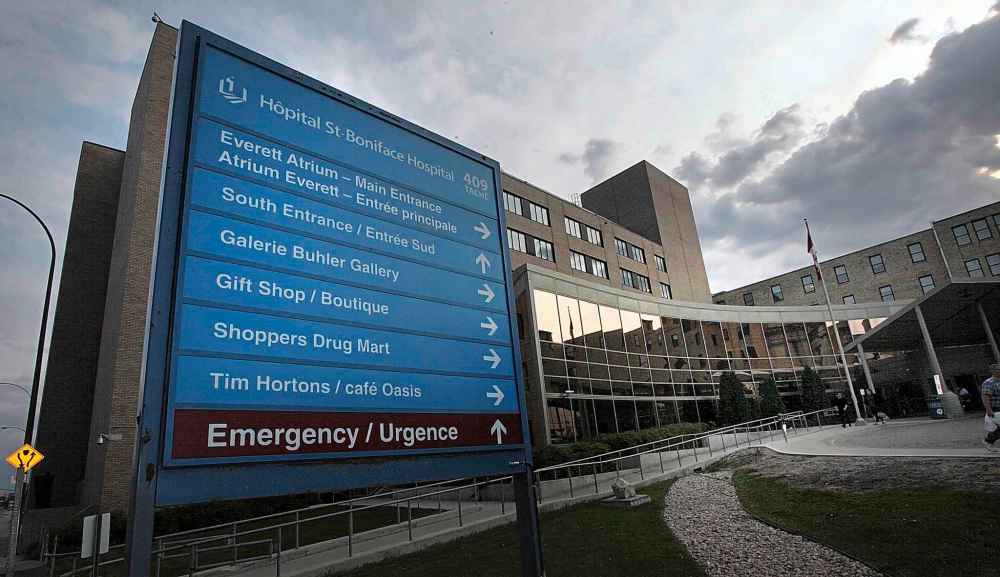St. B staff engagement slammed: report
Advertisement
Read this article for free:
or
Already have an account? Log in here »
To continue reading, please subscribe:
Monthly Digital Subscription
$0 for the first 4 weeks*
- Enjoy unlimited reading on winnipegfreepress.com
- Read the E-Edition, our digital replica newspaper
- Access News Break, our award-winning app
- Play interactive puzzles
*No charge for 4 weeks then price increases to the regular rate of $19.00 plus GST every four weeks. Offer available to new and qualified returning subscribers only. Cancel any time.
Monthly Digital Subscription
$4.75/week*
- Enjoy unlimited reading on winnipegfreepress.com
- Read the E-Edition, our digital replica newspaper
- Access News Break, our award-winning app
- Play interactive puzzles
*Billed as $19 plus GST every four weeks. Cancel any time.
To continue reading, please subscribe:
Add Free Press access to your Brandon Sun subscription for only an additional
$1 for the first 4 weeks*
*Your next subscription payment will increase by $1.00 and you will be charged $16.99 plus GST for four weeks. After four weeks, your payment will increase to $23.99 plus GST every four weeks.
Read unlimited articles for free today:
or
Already have an account? Log in here »
Hey there, time traveller!
This article was published 24/06/2019 (2363 days ago), so information in it may no longer be current.
Employee engagement plummeted at St. Boniface Hospital after the province began consolidating ER services, a new report obtained by the Winnipeg Free Press shows.
The hospital’s engagement score on the 2018 survey was 36 per cent — down from 59 per cent in 2016 after years of steady climbing. Between surveys, the province launched a multi-phase revamp of health care, including consolidating emergency departments from six to three.
Engagement levels reported in the document are consistently worse than across the WRHA (50 per cent engagement) and Canadian averages (64 per cent), and lower than previous years at St. Boniface, going back to 2006.

Manitoba Nurses Union members reported the highest job dissatisfaction at only 24 per cent engaged.
“Nurses have been very vocal about what’s been happening in health care and about the stresses they’re undergoing,” said MNU president Darlene Jackson.
“These results reflect what we’ve been hearing from staff since the changes began.”
Middle managers remained quite engaged (61 per cent) but professionals, specialists and technicians (30 per cent) had the lowest engagement levels. Front-line workers were just below the hospital-wide average at 35 per cent.
“There’s a disconnect,” Jackson said of the disparity between managers’ and nurses’ engagement.
“Nurses are working flat out, the workload is crushing… And it’s like managers and the employers aren’t getting this.”
The survey was conducted one year after 1,000 of the 1,700 nurses at St. Boniface received notices that their jobs had been deleted and they would have to re-apply.
One recently retired St. Boniface nurse, who asked not to be named, said the hospital used to be a wonderful, sought-after place to work.
Now, she said, “I can’t believe it’s the same place I worked at for so many years.”
Employees responded positively to items like “my job is a good fit for my abilities and experience” (76 per cent positive), “my colleagues share best practice and job knowledge” (71 per cent positive) and “my coworkers respect my thoughts and feelings” (70 per cent positive).
“Nurses are in the profession for a reason, they love their job, they love providing patient care, they’re doing what they love,” Jackson said. “I do know that the workload is increasing, voluntary and forced, which does have an impact on the ability to provide care… for a nurse, that’s a really big deal.”
Staff largely disagreed with items like “my performance has a significant impact on my pay” (63 per cent negative) and “as a result of the changes made, our organization is a better organization than it was 12 months ago” (61 per cent negative).
To make the hospital a better place to work, people asked for more staff, less mandated overtime, improved security, doing away with shift work or returning to the old rotation. “Listen to front-line staff,” some responded, others: “Amount of change too much, too fast.”
The retired nurse said that’s still what nurses want. But she’s not sure if people feel safe to come forward.
“They’ve made it a place of total fear … nobody will speak out,” she said, applauding emergency room physician Paul Doucet for speaking out last week.
“I don’t think many of the nurses are going to answer that new survey, because it’s bizarre,” she added, referencing an all-staff survey open until the end of June that asks staff about the hospital’s strengths and their sources of pride.
The survey notes that it can take three years for employee engagement to recover after a major organizational change.
St. Boniface Hospital did not respond to requests for comment on Sunday.
tvanderhart@freepress.mb.ca
Twitter: @tessavanderhart
History
Updated on Monday, June 24, 2019 10:11 AM CDT: Adds PDF of report



